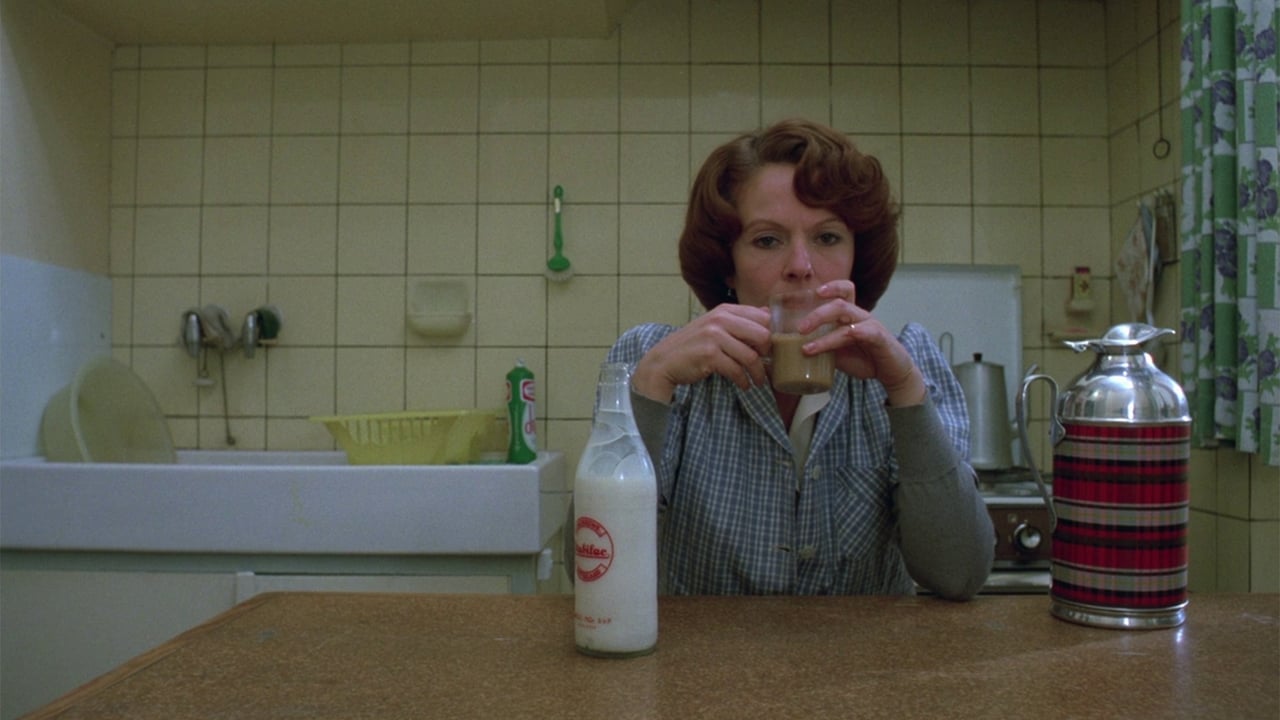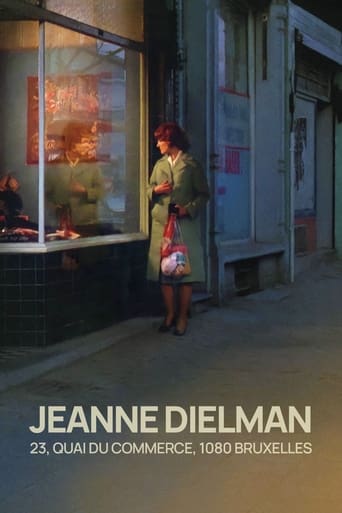

Wonderful character development!
... View Moreridiculous rating
... View MoreYes, absolutely, there is fun to be had, as well as many, many things to go boom, all amid an atmospheric urban jungle.
... View MoreAmazing worth wacthing. So good. Biased but well made with many good points.
... View MoreJeanne Dielman, 23 Commerce Quay, 1080 Bruxelles is a film structured around the daily routine of a seemingly ordinary single housewife. She runs errands, prepares healthy meals for her son, and prostitutes herself in what appears to be the household's solitary source of income. Meanwhile, Jeanne's son appears to be oblivious to exactly how much effort his mother puts into his well-being, focusing on his studying and fitting in with the other students at his school- an act which distances himself from his upbringing and his mother. The film follows Jeanne for three days as her meticulous schedule slowly falls apart around her as she makes mistakes that are frustrating in their simplicity, building tension that ultimately culminates in a climax and bloodshed.The film uses immobile wide shots that never once pan or zoom in to better track the character's in the film. Through the camera usage, the viewers are the epitome of flies on the wall- able to do nothing but watch as Jeanne goes about her routine methodically in real time, adding to the idea of Jeanne being imprisoned in her role as a single mother. Once Jeanne starts cooking a meal, the camera will stay where it is positioned, with no cuts, until the task is complete. With a lesser actress, the static camera could easily result in a disinterested audience, but instead, Delphine Seyrig's sedate actions create a sense of peace and routine that is nearly hypnotizing in its predictability. When this predictability is interrupted, the disturbance is momentous to both the viewers and Jeanne.The film, shot by an all-female crew, upholds unerringly feminist themes. Jeanne appears to have no real friends or interactions outside of her son, her clients, and the occasional shopkeeper. Without exaggeration, all of Jeanne's time is spent bettering the life of her son; she cooks, she cleans, she sells her body for cash- something that is clearly shown to be just another task in her day, rather than something Jeanne enjoys doing. When these tasks are complete, Jeanne is visually shown to be at a loss, sitting silently for long periods of time with no activity. The length of each shot helps the viewer understand exactly how much time Jeanne is forced to be on her own. The time spent idle is not sugarcoated in any way and is used instead to display how unhealthy the isolation is for Jeanne. She is trapped in the role of being a single parent and with that responsibility comes the loss of her individuality. Jeanne's lack of person-hood and frustrated loneliness eventually come to a head with a burst of violence that seems almost inevitable.Despite being over three hours of slow moving, ordinary chores being preformed over the course of three days, Jeanne Dielman is not a film to be missed. Seyrig's quiet performance explores what it means to loose one's self in the daily grind of life, inevitably leaving the viewer with a lingering sense of melancholia long after the film ends.
... View MoreA tribute to the late cinema avant-gardist Chantal Akerman, who committed suicide one month earlier at the age of 65, which stroke as a big shock for auteurist cineastes, despite of the fact that her works have never been acknowledged as festival darlings, or enticed into mainstream filmmaking. JEANNE DIELMAN is her most well-known achievement, a minimalist masterpiece came out 40-years ago, made by her at a young age of 25, Akerman is such a staunch and pioneering saboteur to subvert audience's customary viewing experience and triumphs, which only makes us more regret about her untimely departure.The title refers to the address of Jeanne (Seyrig)'s one-bedroom only apartment, she is a comely widow living with her son Sylvain (Decorte), now a high-schooler, who sleeps on the sofa bed in the living room. The picture runs over 3 hours, spans across 3 days, more precisely, a little longer than 2 entire days, and notably installs long static shots (through various angles) to observe Jeanne doing her daily chores in a mechanically arranged order. From day 1, in the afternoon, 3 minutes into the film, Akerman cunningly stimulates audience with curiosity through the introduction of Jeanne's profession (conveniently she works at home), then, indefatigably details her routines, preparing her 2-course dinner, eating dinner with Sylvain, helping him with homework, reading to him the letter from her sister in Canada, then both take a mysterious night-walk outside before sleeping. Day 2, she wakes up, prepares breakfast, cleans Sylvain's shoes, after he goes to school, she goes out to the post office, grocery, enjoys her coffee break in the bar, takes care of her neighbour's infant, then again prepare food, welcomes a new client, it is a circle meticulously presented and purposefully defies any empathy, thanks to the retiring nature of the mother-and-son pair.Things goes slightly different in the second circle, firstly the overcooked potato (alleged because her customer has overstayed his time) causes their dinner delayed a bit, but they stick to the routine of night-walk, and a terse before bedtime convo with Sylvain stirs Jeanne (sexual activity and pain, an awkward topic between mother and her son), then day 3, the routine goes on, but Jeanne seems to unnoticeably disquieted, being clumsy in the kitchen, maybe because she wonders why the gift from her sister still hasn't arrived, but the coffee suddenly tastes bad, and she cannot find the right button for Sylvain's coat, even in the bar, her usual spot is taken and is served by a new waitress, also neighbour's baby cannot stop crying when she fondly holds her (the only time Jeanne reveals some evident emotion), there is an understated disintegration in the making. Finally, her sister's gift arrives, but also arrives is another client, she barely have time to try the present, and a scissor is left in the boudoir. The long-awaited twist breaks out abruptly, completely terminates the experimental patience-test which meanders near 3 hours, moreover, it intrigues immensely about the rationalism behind Jeanne's behaviour, feminist stance is an easy explanation, but, too literal, a pattern-disruption angle could be more felicitous, Jeanne is an animal of habitual routines, so is the approach towards her means of livelihood, when this pattern is steadily breached in day 3, she simply cannot take it anymore. The origin of the impulse (apart from Jeanne's taciturn nature) can be traced back to the intangible suppression of the society unleashes on woman, especially a single-mother, Akerman scarcely shows any interactions between Jeanne and the outer world, understandably she is protective of her privacy, but the entire atmosphere is not healthy.Some film offers a 2-hour roller-coaster ride then after that it vanishes completely, some instead lulls you into a claustrophobic snooze-fest, but if you can survive it, its repercussions can mark forever in one's head, this film is a paradigm of the latter, bravo for Chantal Akerman! One final comment, Delphine Seyrig is such an mysteriously elegant actress, although most of time she has to act like a cipher in an installation, she can hold viewers spellbound, whether she is peeling potatoes, washing dishes or taking the elevator ups-and-downs.
... View MoreI had no idea what I was in for when I sat down to watch this 3-and-a-half hour experiment. I mean, I knew it would be tedious, and painful, but I had no idea how hypnotizing it would be. I didn't possibly think that after 3 hours of watching someone do daily chores, I would want to continue watching.The first half of the film set up the second half perfectly. After seeing Jeanne's daily routine in the first half, you start noticing small differences throughout the second half, which normally would just be small accidents, but are seen as huge mistakes that rip Jeanne's life apart at the seams. Small things like dropping brushes, forgetting to put the lid on a pot, or not turning off the light when leaving a room turn into major changes that somehow create tension in this idyllic world that Jeanne lives in. One scene, in which Jeanne seems more human than ever, consists of her getting up, going into a room, forgetting what she needed from the room, and then leaving. Don't try to tell me you've never done that.My only real complaint about the film is that it is insanely tedious and repetitive. But I can put this argument aside because 1.) That is precisely the point, and 2.) The twist at the end is extremely satisfying, and gives everything before it purpose. I wouldn't recommend it to everyone, but if you have a long attention I'd say go for it. Just make sure your seat is comfortable enough to sit in for three to four hours, but not enough to fall asleep in.
... View MoreWARNING!!!! MAY CONTAIN SPOILER!!!I see all these reviews praising what a great feminist film this is and so I watched it (or tried to watch it). My god! And I'm not religious. Thank god for the fast forward button. Firstly, what an insult to all stay at home moms. This film makes our daily chores seem boring, unimportant and mostly painful. Jeanne Dielman was obviously a mentally insane woman that was not happy. This film, if you could call it that, is more like an experimental art projection that should've been no longer than 30 minutes. Who cares if the crew were woman on this film? The message certainly isn't feminist or empowering to women. I wanted to shoot myself after an hour watching this. Is this really the life of a housewife? No joy at all? And also these were the times when women could be a housewife and it was okay. Not like current times when housewives are looked down upon and we are expected to do all this and bring home a paycheck! I think Jeanne had it pretty easy. In current times, we would be doing all these household chores and wouldn't have time to sit down waiting for our potato to cook. We would have to be multi-tasking. I say the lead character was just ungrateful for what she had. Also, she was a PROSTITUTE! Is that really feminist? To be prostituting yourself instead of getting a J-O-B at something that betters you as a person. Also, her kid looked too old and was too old to be having her shoes polished by her mom and everything done by her. Did she really have to do everything for him? Lastly, Jeanne was too pretty and attractive to not have bunch of dirty French men chasing her where ever she was. Not realistic! And it seems they were going for realism. Bottom line, this film is out-dated. Been there, done that and not impressive. It easy to shoot the boring lives of daily life and hard to actually entertain and have a story.
... View More